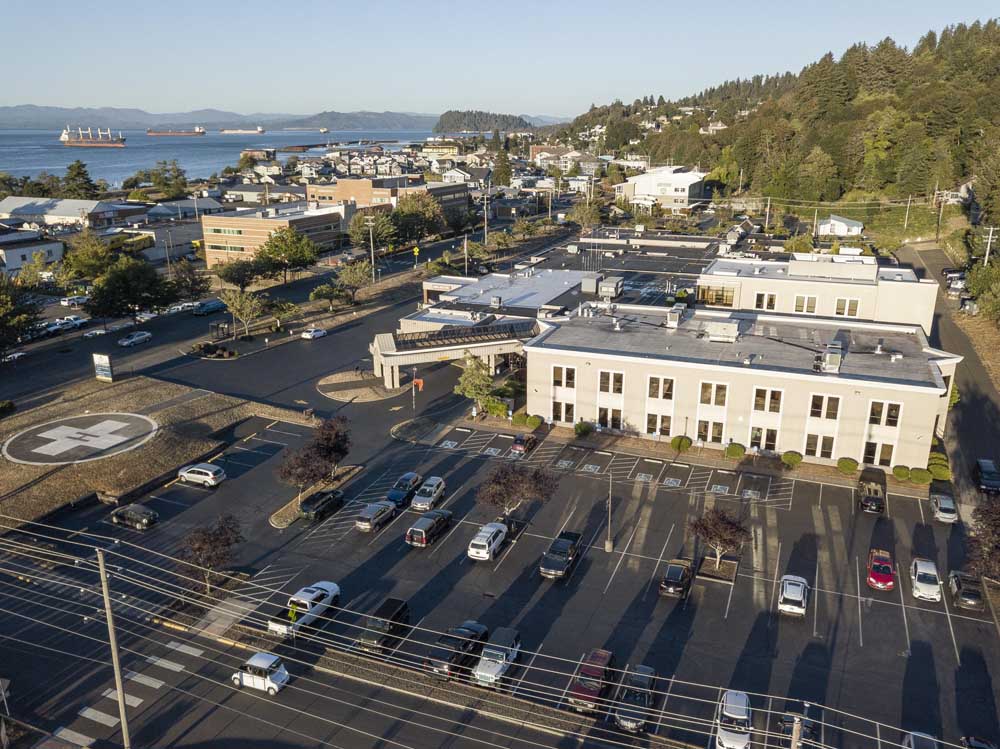Trump administration cancels preparedness grant for hospital
Published 9:27 pm Sunday, April 13, 2025

- Lydia Ely/The Astorian
The Federal Emergency Management Agency has canceled a $14 million grant that would have gone toward the expansion of Columbia Memorial Hospital.
Important funding for a North Coast hospital has disappeared after the Trump administration ended a grant program intended to help communities prepare for disasters including earthquakes and tsunamis.
The Federal Emergency Management Agency announced it was ending the Building Resilient Infrastructure and Communities program last week. The program had been started under the first Trump administration. In a news release, a FEMA spokesperson said the decision to halt the program now was part of an effort to eliminate “waste, fraud and abuse.”
Columbia Memorial Hospital was set to receive a $14 million grant through the program. On Thursday, Justin Gibbs, Clatsop County’s emergency management director, confirmed that the bulk of that money will not be awarded.
Columbia Memorial is in the middle of a $300 million expansion project at its Astoria campus. Last year, hospital leadership said the FEMA grant was a significant development and would help create a resilient campus that could withstand extreme weather and natural disasters.
The funding would have allowed for the inclusion of features like a vertical evacuation staircase and a safe refuge space on the hospital’s roof, among other measures, to protect patients and staff during a natural disaster.
“CMH is disappointed to learn that the (FEMA grant) is now canceled,” the hospital said in a statement. “We have been meeting with the Office of Emergency Management, Clatsop County Emergency Management and as a project team to understand the impacts this will have to the project.”
Gibbs said Columbia Memorial will still receive around $322,000 of the grant that had already been committed to cover preconstruction costs. Clatsop County was a subrecipient of the grant and served as a kind of pass-through to the hospital and will manage the closing out of those funds.
Gibbs said the FEMA program was one of the only opportunities available for the kind of predisaster mitigation work the hospital had planned for its campus — work Gibbs said aligned with the county’s goals and efforts when it comes to emergency preparedness on the North Coast.
A report by FEMA in 2020 showed that every $1 invested in making buildings more resilient to hazards like earthquakes and tsunamis saves communities significant money in recovery costs.
Now, with the loss of the $14 million for Columbia Memorial and, potentially, the loss of the planned resiliency features, Gibbs said, “It means our community could recover less quickly if something does happen.”
“And the hospital is critical infrastructure,” he added. “It’s really where we should be investing that money because those particular capabilities are going to help the community recover quicker and provide the critical services that are needed if we do experience a disaster.”
KMUN spoke to Erik Thorsen, CEO of Columbia Memorial Hospital, in early March. While the landscape for federal funding was uncertain at the time, Thorsen said there was no indication that the hospital’s FEMA grant was in any danger.
On Thursday, Gibbs told KMUN, “It’s very shocking — I think to everybody — that this program was canceled because we didn’t have any indication that this was going to be the outcome.”
As part of the grant program, Columbia Memorial would have been required to provide $6 million in matching funds to bring the total award to $20 million.
The hospital was looking to the state to provide the match and submitted a request this spring to the Legislature’s Joint Committee on Ways and Means, which sets Oregon’s budget policy.
Coastal lawmakers acknowledged $6 million was a “big ask” and that uncertainty around federal funding generally could place a bigger burden on the state, kicking Columbia Memorial’s request down on the list of priorities. But they also pointed to the hospital’s planned resiliency components, like the evacuation staircase, as a positive selling point.
Even with the FEMA grant no longer on the table, state Sen. Suzanne Weber, a Tillamook Republican who represents the North Coast, believes the hospital still could see money from the state.
“Yes, it’s a possibility,” she told KMUN.
Columbia Memorial has already raised the bulk of the money it will need for the overall project, and the expansion will benefit the wider coastal community, Weber said.
“I think the whole project is a resiliency project,” she argued, calling the decision to halt the FEMA grants “very disconcerting.”
Weber does not serve on the Joint Ways and Means Committee, but she has been a supporter of the hospital project and has pushed for it to receive the $6 million it has requested.




